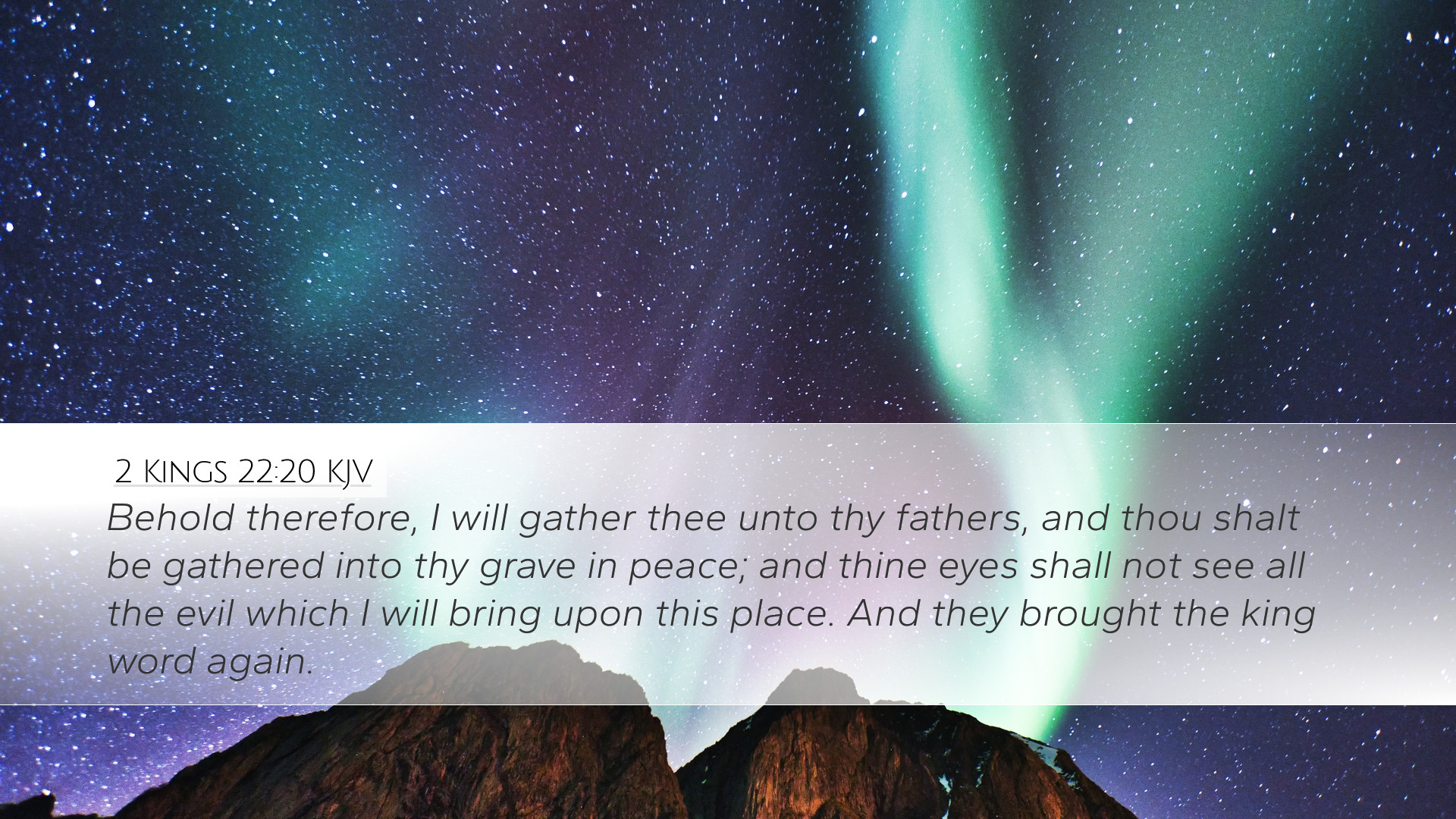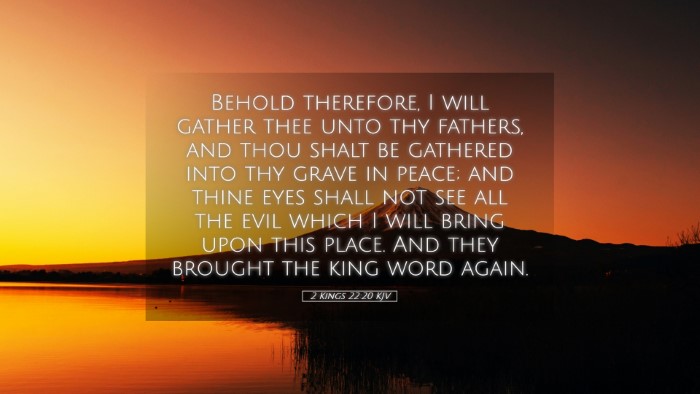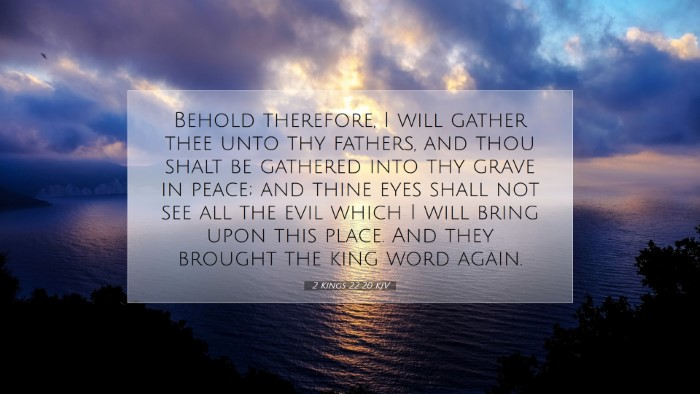Old Testament
Genesis Exodus Leviticus Numbers Deuteronomy Joshua Judges Ruth 1 Samuel 2 Samuel 1 Kings 2 Kings 1 Chronicles 2 Chronicles Ezra Nehemiah Esther Job Psalms Proverbs Ecclesiastes Song of Solomon Isaiah Jeremiah Lamentations Ezekiel Daniel Hosea Joel Amos Obadiah Jonah Micah Nahum Habakkuk Zephaniah Haggai Zechariah Malachi2 Kings 22:20
2 Kings 22:20 KJV
Behold therefore, I will gather thee unto thy fathers, and thou shalt be gathered into thy grave in peace; and thine eyes shall not see all the evil which I will bring upon this place. And they brought the king word again.
2 Kings 22:20 Bible Commentary
Commentary on 2 Kings 22:20
2 Kings 22:20 states, "Therefore, behold, I will gather you to your fathers, and you shall be gathered to your grave in peace, and your eyes shall not see all the evil that I will bring upon this place." This verse marks a pivotal moment in King Josiah's reign and speaks volumes about God's judgment, mercy, and the state of the nation of Judah. Below is a detailed exposition of this scripture drawing insights from various public domain commentaries.
Contextual Background
The context of 2 Kings 22 is critical for understanding the significance of this verse. King Josiah, a reformer, had returned the nation to the worship of Yahweh after years of idolatry. The finding of the Book of the Law sparked a national revival and deep repentance among the people. This chapter details a significant moment when Josiah seeks the Lord after hearing the words of the Book of the Law, expressing the impending judgment that God has declared upon Judah for its sins.
Exegesis of 2 Kings 22:20
In this verse, God's declaration through the prophetess Huldah serves to comfort King Josiah while simultaneously affirming the inevitability of judgment against Jerusalem. The verse can be broken down into several key components:
- Gathering to Your Fathers: This phrase signifies death, indicating that Josiah will not witness the destruction of Jerusalem. The reference to the fathers suggests a reunion with those who have gone before him in faith and a peaceful end to his life.
- Gathered to Your Grave in Peace: This aspect stresses that during Josiah's lifetime, he will enjoy a period of peace, contrasting sharply with the turmoil that awaits the nation after his death. Herein lies an expression of God’s mercy, as Josiah's righteous actions forestall immediate judgment.
- Eyes Not Seeing Evil: The ultimate pronouncement is one of grace towards a king whose heart is inclined towards God. Josiah's immediate response to the Law has elicited a protective measure from God; however, the persistent idolatry of the nation harbors severe consequences for future generations.
Theological Implications
This verse touches on several significant theological themes:
- The Concept of Grace: God’s mercy towards Josiah is a profound reminder that righteousness can affect one’s legacy and temporal outcomes, demonstrating God’s graciousness even in the face of impending judgment.
- Judgment and Restoration: Huldah's message embodies the dichotomy of divine judgment and the promise of restoration, revealing God’s character as just but also merciful.
- The Role of Leadership: Josiah's actions are pivotal, exemplifying how a leader’s faithfulness can ultimately impact the community’s fate, suggesting a vital principle of spiritual responsibility.
Insights from Commentators
Various esteemed commentators provide further depth on this scripture:
Matthew Henry
Henry reflects on the measure of Josiah's reign, commenting that it serves as a stark contrast to his predecessors. He highlights how Josiah's reforms were motivated by a genuine love for God and His Word, which ultimately shielded him from the forthcoming calamity. Henry emphasizes the providence of God in timing, noting how God grants Josiah the peace he sought, not for the merit of his actions but due to God's sovereign grace.
Albert Barnes
Barnes offers a perspective on the significance of Josiah's death. He states that Josiah's faithfulness may have averted the disaster for his time, showcasing God’s vindication of righteous leadership. Barnes highlights the importance of understanding the implications of prophetic words, suggesting that while Josiah would not see the evil, his life served as a prelude to an impending judgment, illustrating the prophetic tension between immediate and future consequences.
Adam Clarke
Clarke delves into the prophetic aspect of Huldah’s message, noting that it serves as both a reassurance to Josiah and a sober warning to the people of Judah. He suggests that God’s promise to spare Josiah from witnessing the consequences of the nation’s sin highlights the gravity of turning away from God’s commandments. Clarke emphasizes the lesson on accountability, indicating that judgment, while postponed, is inevitable for a people that forsakes divine statutes.
Conclusion
In summary, 2 Kings 22:20 reflects not only the heart of God towards a faithful servant in Josiah but also serves as a backdrop against which the themes of judgment, mercy, and the consequences of national sin are illuminated. The commentator insights enrich our understanding of this passage, revealing profound truths applicable to contemporary believers. For pastors, students, and theologians, this scripture serves as a call to uphold righteousness, ensuring that God's grace may extend through their actions, influencing their communities positively.


